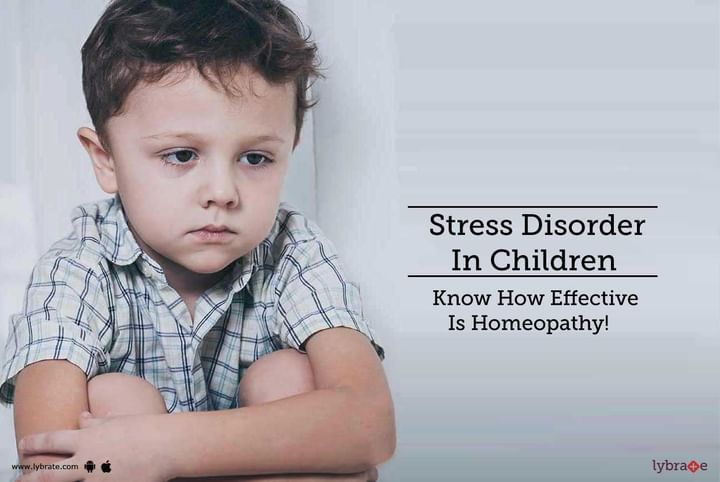Stress Disorder In Children - Know How Effective Is Homeopathy!
Is your child irritable? Not eating well or underperforming at school?
Relax! Losing your mind and temper won't help.
There are chances that your child is under stress and needs your support during this testing time. Let's gain a better understanding of the problem as a mature step towards positive parenting.
Stress, either intrinsic or extrinsic, can affect your child as easily as it may affect you. There are several causes as to why your child may also be stress-laden even at such a tender age. As pre-schoolers, the major cause of stress stems from the anxiety of leaving their parents and spending long hours in an external environment. As a child grows up, further causes of stress may include:
- Overwhelming schedule due to a large number of academic and extra-curricular activities
- High expectations of parents and pressure to perform
- Lifestyle or status associated peer-pressure
- Conflict between parents / domestic violence / Divorce of parents
- Moving to a new town or city
- Serious illness
- Physiological changes during puberty
- Worry about getting along with friends
Warning signals that your child is under stress:
- Aggression: Children are prone to a high number of aggressive outbursts as they are not as much in control of their emotions as adults are. They may often react with physical aggression (biting, kicking, or hitting) or verbal aggression (screaming or abusing). This can, however, be curbed in a number of ways such as setting firm and consistent limits, and avoiding instilling in them the idea of 'toughness'.
- Bed wetting: Though stress and anxiety may not be essential causes that lead to the advent of bedwetting in children, it often accentuates the same. You should reassure your child that you are not angry when he/she has an accident and see the doctor to rule out any other medical causes.
- Hyperactive behavior: When children can't handle stress, they release negative energy. Having temper tantrums, running away, or constantly being disobedient are ways to alert adults that there is a problem. Help your child burn off energy in a positive, calming way. Deep breathing exercises, listening to soothing music, stretching, or yoga help.
- Withdrawal: Social withdrawal and being frequently moody or irritable can often arise from high levels of stress, social fear and anxiety in children. Offer plenty of positive attention and speak to your child's teacher if you suspect he/she is having trouble with friends at school.
- Eating and sleeping disorders: If your child is sleeping less or sleeping more than usual, then it might be an indication that something is not right with your child. Likewise, if there is any change in an eating pattern which you find abnormal, then it indicates trouble. This may often stem from stress or anxiety-related issues and hamper the proper growth and nutrient intake in a growing child.
How you can help your child?
There are several things you can do to help your child work through his/her problems when it comes to combating stress and anxiety. These include:
- Have a friendly relation with kids so that they feel free to share their problems/ feelings. Kids generally hide things out of fear. Motivate them to express and share their worries.
- Try to understand the cause of the stress. Talk about their fears and apprehensions. Make them feel they are understood.
- Do not force them to sleep or eat. Encourage to eat well and sleep in time.
- The child should be encouraged to indulge in some physical activities like walk/ jog/sports and relaxation exercises like deep breathing/meditation
- Avoid burdening them with studies and co-curricular activities. Identify their abilities and interest and respect individual limitations. Don't burden them with your expectations.
- There should be sufficient breaks in between studies for rejuvenation. It motivates and enhances productivity.
- Avoid demeaning/insulting remarks. Avoid comparisons with other kids.
- Avoid negative reactions like scolding/sarcasm/shouting/beating. Teach the child appropriate ways of managing emotions like open communication, sharing a state of mind with peers and parents and appropriate anger management techniques.
- You should also talk to teachers and peers if you suspect any problem at school and find a solution through their help.
- Teach the child about time management. Let them know how to prioritize work according to importance and urgency of the task.


+1.svg)
